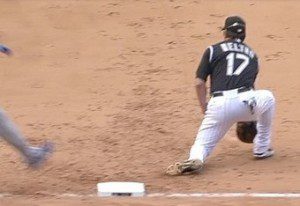
Tim Welke must be in favor of instant replay in the majors. There’s no other way to explain his egregiously bad call during Wednesday’s game between the Los Angeles Dodgers and Colorado Rockies at Coors Field.
In what many commentators (and tweeters) are calling the “worst call ever,” 27-year veteran umpire Tim Welke, stationed at first base for the game, missed a call so obvious that it basically shot Dodgers manager Don Mattingly out of the dugout to argue. And looking at the evidence, it seems like a call that no MLB umpire should miss.
And quite honestly, it’s true. The call is almost dumbfounding. Third baseman Chris Nelson‘s throw was rushed and wide. First baseman Todd Helton‘s foot was nowhere near the bag. Jerry Hairston Jr. was safe.
There have been questionable calls from umpires in the past in much more important situations. It was only two years ago that Tigers pitcher Armando Galarraga lost his chance at a perfect game on a blown call by umpire Jim Joyce. After public apologies, handshakes, and hugs, they’ve all moved on from the incident. And while Joyce’s call may be more historically significant, Welke’s effectively resurrects an equally imperative discussion: the use of instant replay.
Instant replay in baseball is essentially in its infancy. While it has been discussed for quite some time, its exclusive use, as of right now, is to determine whether the ball is a home run or not; be it a fair or foul dispute, or if the ball actually left the playing field. Pending amendments include using instant replay to determine fair or foul balls in play, and whether or not a ball is caught by a player or merely trapped, or caught on a bounce, by the fielder.
It is time to officially open discussions on instant replay requests. Had Mattingly requested an official review of the call, it would undoubtedly be overturned. The call was incorrect in the most obvious of ways, and yet the Dodgers were powerless to do anything about it. The human element of umpiring is a key element of the game, but when it can be so blatantly inaccurate, should it merely be accepted?
Myriad possibilities in the realm of instant replay makes this discussion a difficult one to thoughtfully analyze. Just as in other sports, there must be limits placed and concessions made. While a safe or out call at first base seems simple, where does one draw the line? Strikes and balls are anything but empirical science, and could never be effectively challenged by instant replay. Throw in shadow tags, running off the basepaths, and dropped third strikes, and things start to pile up.
The argument is undeniably broad in scope, and one blown call should not overturn generations of accepted rules. Welke is, after all, human just like you and I. And while his call was laughably incorrect, no one should be laughing at, or even angry with, Welke. Umpires are the one group of officials with the harshest spotlight cast upon them, and the job is anything but easy. The Dodgers lost to the Rockies 8-5, and there’s nothing that can be done to change that.
What can be done is make sure that this eventually never happens again. The Dodgers had one of their 27 outs taken away from them. It’s worth discussing giving them the power to do something about it.
